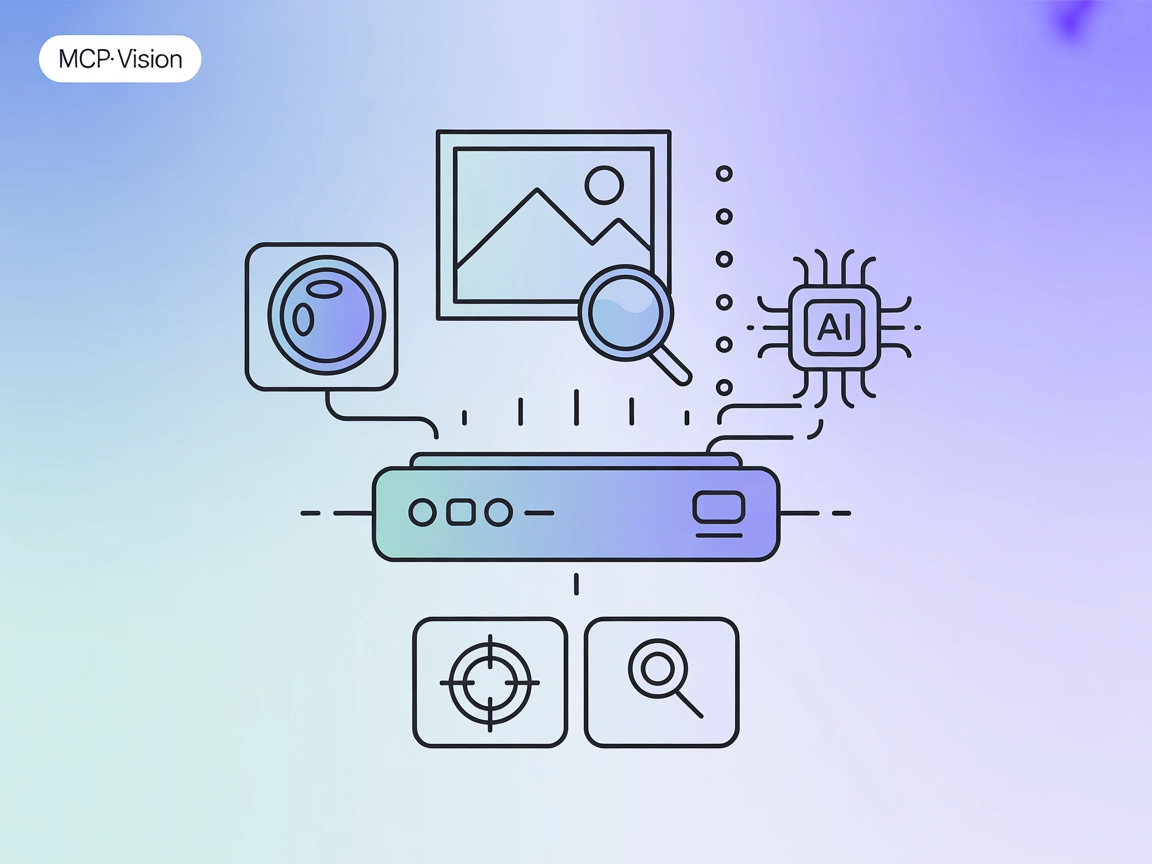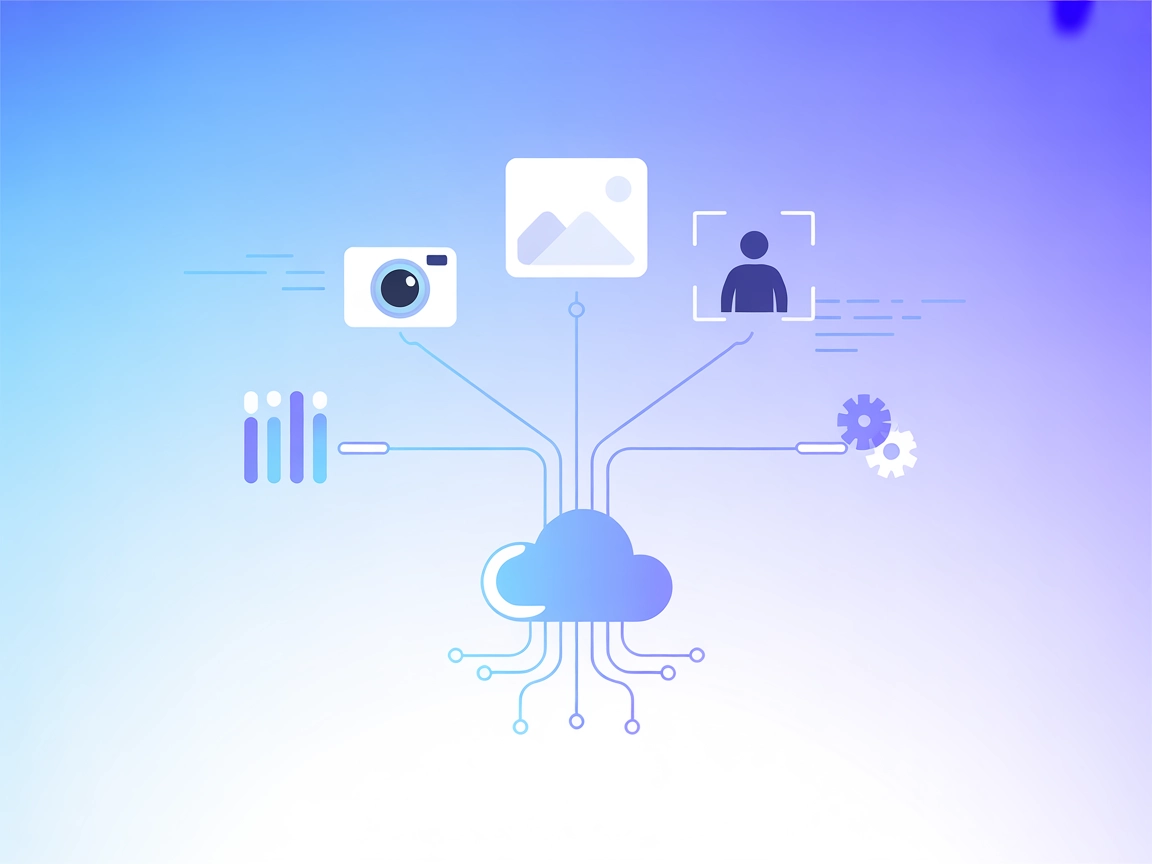
mcp-vision MCP Server
The mcp-vision MCP Server connects HuggingFace computer vision models—like zero-shot object detection—to FlowHunt and other AI platforms, empowering LLMs and AI...

Connect AI workflows to OpenCV’s full suite of computer vision capabilities using the OpenCV MCP Server for seamless automation and advanced image/video processing.
FlowHunt provides an additional security layer between your internal systems and AI tools, giving you granular control over which tools are accessible from your MCP servers. MCP servers hosted in our infrastructure can be seamlessly integrated with FlowHunt's chatbot as well as popular AI platforms like ChatGPT, Claude, and various AI editors.
The OpenCV MCP Server provides OpenCV’s image and video processing capabilities through the Model Context Protocol (MCP). It acts as a bridge, enabling AI assistants and developer tools to access advanced computer vision functionalities. This server allows seamless execution of tasks such as basic image manipulation, object detection, and visual tracking by exposing OpenCV tools and workflows via a standardized protocol. By integrating with external data sources, APIs, or services, it empowers developers to build richer, context-aware AI-powered applications and automations that leverage the full potential of OpenCV from within their preferred development environments.
No prompt templates are explicitly listed in the repository or documentation.
No explicit resources are listed in the repository or documentation.
No detailed tool list is provided in the repository or documentation. However, the description suggests exposure of image and video processing capabilities, basic image manipulation, and object detection tools.
mcpServers section using the following JSON snippet:{
"opencv-mcp": {
"command": "npx",
"args": ["@opencv/mcp-server@latest"]
}
}
mcpServers array:{
"opencv-mcp": {
"command": "npx",
"args": ["@opencv/mcp-server@latest"]
}
}
mcpServers:{
"opencv-mcp": {
"command": "npx",
"args": ["@opencv/mcp-server@latest"]
}
}
{
"opencv-mcp": {
"command": "npx",
"args": ["@opencv/mcp-server@latest"]
}
}
Store sensitive API keys in environment variables instead of configuration files. Reference them in your configuration as shown:
{
"opencv-mcp": {
"command": "npx",
"args": ["@opencv/mcp-server@latest"],
"env": {
"API_KEY": "${OPENCV_API_KEY}"
},
"inputs": {
"apiKey": "${OPENCV_API_KEY}"
}
}
}
Using MCP in FlowHunt
To integrate MCP servers into your FlowHunt workflow, start by adding the MCP component to your flow and connecting it to your AI agent:

Click on the MCP component to open the configuration panel. In the system MCP configuration section, insert your MCP server details using this JSON format:
{
"opencv-mcp": {
"transport": "streamable_http",
"url": "https://yourmcpserver.example/pathtothemcp/url"
}
}
Once configured, the AI agent is now able to use this MCP as a tool with access to all its functions and capabilities. Remember to change “opencv-mcp” to the actual name of your MCP server and replace the URL with your own MCP server URL.
| Section | Availability | Details/Notes |
|---|---|---|
| Overview | ✅ | Provided in README and description |
| List of Prompts | ⛔ | No prompt templates listed |
| List of Resources | ⛔ | No resources listed |
| List of Tools | ⛔ | No explicit tool list; only general capabilities mentioned |
| Securing API Keys | ✅ | Security via env variables shown in setup instructions |
| Sampling Support (less important in evaluation) | ⛔ | No mention of sampling support |
Based on the available information, the OpenCV MCP Server provides a clear overview and setup guidance, but lacks public documentation on prompt templates, explicit resources, and detailed tool definitions. For developers seeking computer vision capabilities in MCP, it offers value, but would benefit from richer documentation and examples.
| Has a LICENSE | ✅ (MIT) |
|---|---|
| Has at least one tool | ⛔ |
| Number of Forks | 1 |
| Number of Stars | 19 |
Overall, I would rate this MCP server a 4/10 based on current visibility: it is open source, clearly scoped for OpenCV tasks, but lacks detailed documentation on tools, prompts, and resources needed for advanced or transparent integration.
It exposes OpenCV’s image and video processing features via the Model Context Protocol (MCP), enabling developers and AI agents to automate and access computer vision tasks—like image manipulation, object detection, and video analysis—within their preferred platforms.
Add the server configuration to your platform’s MCP server list (Windsurf, Claude, Cursor, or Cline), using the provided JSON snippet. Save and restart your application to enable the server.
Typical use cases include image resizing/cropping, object detection, video frame analysis, AI-powered document processing, smart surveillance, and dataset augmentation for machine learning, all automated from your development environment.
Store sensitive API keys as environment variables, and reference them in your configuration file instead of hardcoding them directly. Example provided in the documentation.
Yes. Add the MCP component to your FlowHunt flow, then insert your OpenCV MCP server details in the configuration panel. This allows your AI agent to access all OpenCV-powered vision tools in your workflows.
Leverage advanced computer vision directly in your flows. Set up the OpenCV MCP Server and unlock new AI-powered automation possibilities.

The mcp-vision MCP Server connects HuggingFace computer vision models—like zero-shot object detection—to FlowHunt and other AI platforms, empowering LLMs and AI...

Video Still Capture MCP is a Python-based server that provides AI assistants with real-time webcam and video source access through OpenCV, enabling image captur...

The Model Context Protocol (MCP) Server bridges AI assistants with external data sources, APIs, and services, enabling streamlined integration of complex workfl...
Cookie Consent
We use cookies to enhance your browsing experience and analyze our traffic. See our privacy policy.